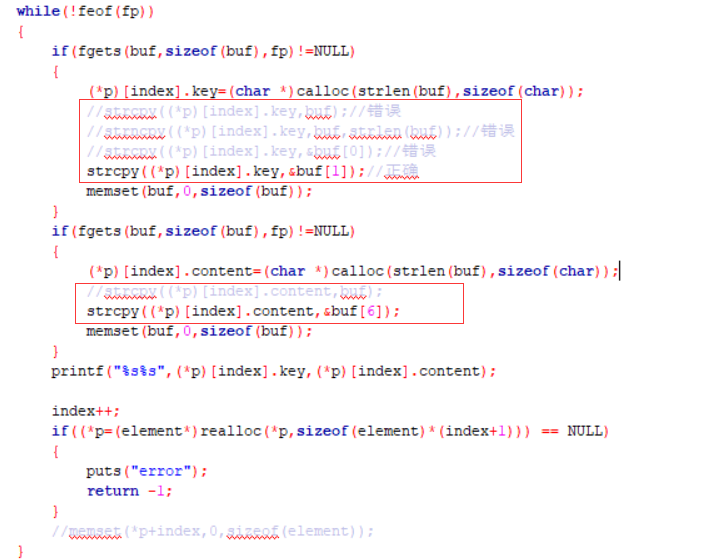strcpy复制数组,程序异常奔溃
问题:解释一下我备注错误的地方为什么会使程序崩溃。
开发IDE:codeblock17.12
链接:https://pan.baidu.com/s/1wwoP4v_Y5xYJtH7WZIWjdw 密码:gm87
#include<stdio.h>
#include<stdlib.h>
#include<string.h>
typedef struct element
{
char *key;
char *content;
}element;
char buf[2048]={0};
int get_elements(element **p,char * file_name)
{
FILE * fp=fopen(file_name,"r");
if(fp==NULL)
{
printf("打开文件失败!");
return -1;
}
*p=(element*)malloc(sizeof(element));
//char buf[2048]={0};
int index=0;
while(!feof(fp))
{
if(fgets(buf,sizeof(buf),fp)!=NULL)
{
(*p)[index].key=(char *)calloc(strlen(buf),sizeof(char));
//strcpy((*p)[index].key,buf);//错误
//strncpy((*p)[index].key,buf,strlen(buf));//错误
//strcpy((*p)[index].key,&buf[0]);//错误
strcpy((*p)[index].key,&buf[1]);//正确
memset(buf,0,sizeof(buf));
}
if(fgets(buf,sizeof(buf),fp)!=NULL)
{
(*p)[index].content=(char *)calloc(strlen(buf),sizeof(char));
//strcpy((*p)[index].content,buf);
strcpy((*p)[index].content,&buf[6]);
memset(buf,0,sizeof(buf));
}
printf("%s%s",(*p)[index].key,(*p)[index].content);
index++;
if((*p=(element*)realloc(*p,sizeof(element)*(index+1))) == NULL)
{
puts("error");
return -1;
}
//memset(*p+index,0,sizeof(element));
}
fclose(fp);
return index;
}
int search_element(element *p,int n,const char * key)
{
int i=0;
for(i=0;i<n;i++)
{
//if(strcmp(p[i].key,key)==0)//p[i].key[3]是'\n'字符,key[3]是'\0'字符
if (strncmp(p[i].key, key, strlen(key)) == 0)
{
printf("%s",p[i].content);
return 1;
}
}
return -1;
}
//最好还是传指针的地址,不然就是野指针
int free_elements(element *p,int n)
{
int i=0;
for(i=0;i<n;i++)
{
if (p[i].key)
free(p[i].key);
if (p[i].content)
free(p[i].content);
}
free(p);
return 0;
}
int main()
{
char file_name[]="dict.txt";
element *p=NULL;
int n = get_elements(&p,file_name);//将词典的内容读到内存
search_element(p,n,"you");
free_elements(p,n);
return 0;
}
工程文件包:
链接:https://pan.baidu.com/s/1FfHerOqcVlGoP3-vSvXMIA 密码:b1gu
如果dict.txt是如下格式
key:content
可以做如下修改,代码中对于一些问题做出了建议,不对之处可以讨论
#include
#include
#include
typedef struct element
{
char *key;
char *content;
}element;
char buf[2048]={0};
int get_elements(element **p, char * file_name)
{
FILE * fp=fopen(file_name,"r");
if(fp==NULL)
{
printf("打开文件失败!\n");
return -1;
}
//*p=(element*)malloc(sizeof(element));
//char buf[2048]={0};
//index为string.h库中函数名,在包含该库的时候建议不使用
int iIndex=0;
while(!feof(fp))
{
//将内存分配放在这里,确保文件有内容可读的时候才分配内存
if((*p=(element*)realloc(*p,sizeof(element)*(iIndex+1))) == NULL)
{
puts("error");
return -1;
}
memset(buf,0,sizeof(buf));
if(fgets(buf,sizeof(buf),fp)!=NULL) //读取文件一次,读取
{
(*p)[iIndex].key=(char *)calloc(strlen(buf),sizeof(char));
//strcpy((*p)[index].key,buf);//错误
//strncpy((*p)[index].key,buf,strlen(buf));//错误
//strcpy((*p)[index].key,&buf[0]);//错误
char *sepIndex = index(buf, ':');
//查找key
strncpy((*p)[iIndex].key, buf, sepIndex-buf);//strcpy很容易造成内存益处,建议使用strncpy
//查找content
(*p)[iIndex].content=(char *)calloc(strlen(buf),sizeof(char));
strncpy((*p)[iIndex].content, sepIndex+1, strlen(sepIndex+1));
sepIndex = NULL;
/*
if(fgets(buf,sizeof(buf),fp)!=NULL)
{
(*p)[index].content=(char *)calloc(strlen(buf),sizeof(char));
//strcpy((*p)[index].content,buf);
strcpy((*p)[index].content,&buf[6]);
memset(buf,0,sizeof(buf));
}
*/
printf("%s: %s",(*p)[iIndex].key,(*p)[iIndex].content);
}
++iIndex;
/*
//如果扩展内存放这里,意味着如果已经到了文件尾,还是继续分配了内存,造成资源浪费
if((*p=(element*)realloc(*p,sizeof(element)*(iIndex+1))) == NULL)
{
puts("error");
return -1;
}
//memset(*p+index,0,sizeof(element));
/
}
fclose(fp);
return iIndex;
}
int search_element(element *p,int n,const char * key)
{
int i=0;
for(i=0;i<n;i++)
{
//if(strcmp(p[i].key,key)==0)//p[i].key[3]是'\n'字符,key[3]是'\0'字符
if (strncmp(p[i].key, key, strlen(key)) == 0)
{
printf("%s",p[i].content);
return 1;
}
}
return -1;
}
//最好还是传指针的地址,不然就是野指针
//这里你只释放了结构体内部的指针,对于结构体本身的指针并没有释放
/
int free_elements(element *p,int n)
{
int i=0;
for(i=0;i<n;i++)
{
if (p[i].key)
free(p[i].key);
if (p[i].content)
free(p[i].content);
}
free(p);
return 0;
}
*/
int free_elements(element **p,int n)
{
int i=0;
for(i=0;i<n;i++)
{
if ((*p)[i].key)
free((*p)[i].key);
if ((*p)[i].content)
free((*p)[i].content);
}
free(*p);
*p = NULL;
return 0;
}
int main()
{
char file_name[]="dict.txt";
element *p=NULL;
int n = get_elements(&p,file_name);//将词典的内容读到内存
search_element(p,n,"you");
free_elements(&p,n);
return 0;
}
你的dict.txt格式是什么样的
p=(element)malloc(sizeof(element));
//char buf[2048]={0};
int index=0;
while(!feof(fp))
{
可以检查一下内存是否对齐,打印一下目标地址和源地址。